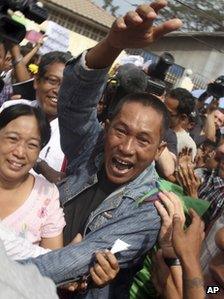Burma frees high-profile dissidents in amnesty
- Published
- comments
The BBC's Rachel Harvey says the move is a "hugely significant step"
Burma's most important dissidents have been released, in the latest of a series of prisoner amnesties.
Those freed include veterans of the 1988 student protest movement, monks involved in the 2007 demonstrations and ethnic-minority activists.
The highest profile is Min Ko Naing, a leader of the failed 1988 uprising.
State TV had announced that 651 prisoners would be freed under a new presidential pardon, but did not say how many would be political prisoners.
In a statement broadcast on the TV, President Thein Sein said those released were people who could "play a constructive role in the political process".
Responding to the release, UK Foreign Secretary William Hague said: "The release of all political prisoners is a long-standing demand of the international community and I warmly welcome these releases as a further demonstration of the Burmese government's commitment to reform."
BBC South East Asia correspondent Rachel Harvey says the names of those released read like a who's who of Burma's most prominent political detainees.
Given their stature, this could be the most significant breakthrough yet in Burma's moves towards reform, she says.
But some Burmese exiles and campaign groups say the real test will be how much freedom the released prisoners will have to continue their activities, our correspondent adds.
'Positive sign'
Min Ko Naing was considered by many to be the highest-profile dissident still behind bars.
A crowd greeted him as he emerged from prison in Thayet, 545km (345 miles) north of Rangoon, the Associated Press news agency reported.
Another veteran member of Burma's 88 Generation Students, Nilar Thein, confirmed to the BBC that she had been freed from Tharya Wadi prison.
The activist served eight years in prison after the 1988 demonstrations and was jailed again in 2008 for 65 years for illegally using electronic media.

There were scenes of jubilation outside Insein prison in Rangoon
"I'm healthy and happy to be released and happy to see my baby," she told the BBC, referring to her daughter, born the year before her imprisonment.
She said that although she had been released, 25 more political prisoners remained inside the prison.
Her husband, Kyaw Min Yu, known as Ko Jimmy, has also been freed, as well as Htay Kywe, a student activist jailed in 2007 for 65 years.
"We have been trying all the time to have national reconciliation through political dialogue," Ko Jimmy told the BBC.
"Since the new government accepts this concept, we can now work with them."
Another student leader, Ko Ko Gyi, said he was excited about being released.
"The rule of democracy is the buzz word in our country so they cannot U-turn, that's what I think," he told the BBC.
Former Prime Minister Khin Nyunt, who was detained in a purge in 2004, has been released from house arrest.
U Khun Tun Oo, the most senior political representative of the Shan, the largest of Burma's ethnic minorities, is also free.
'Rope around my neck'
Pro-democracy leader Aung San Suu Kyi said the move was a "positive sign".
Five of those released were journalists from the exiled broadcaster Democratic Voice of Burma, based in Chiang Mai, Thailand.
One of them, Sithu Zeya, said he was wary of the conditions placed on his release.
"I have been released with a rope around my neck," he said, saying that the charges against him had not been lifted and that he feared the government would not let him do his job.
The military-backed civilian government came to power in November 2010, after the country's first elections in 20 years. Before that Burma was governed by a military junta.
Wai Hnin Pwint Thon describes her cautious optimism following her father Mya Aye's release
It has freed Ms Suu Kyi and begun dialogue with her and her The National League for Democracy (NLD). She is now expected to stand for parliament in a by-election in April.
Western nations have welcomed the reform process but called on the government to release political prisoners and resolve ethnic conflicts in border regions before sanctions can be eased.
No official tally of the number of political prisoners is available but prior to Friday's releases opposition groups estimated that up to 1,500 remained in custody.
The releases come a day after the government signed a landmark ceasefire with the rebel Karen National Union (KNU) in Hpa-an, capital of eastern Karen state.
The Karen have fought for greater autonomy for more than 60 years.